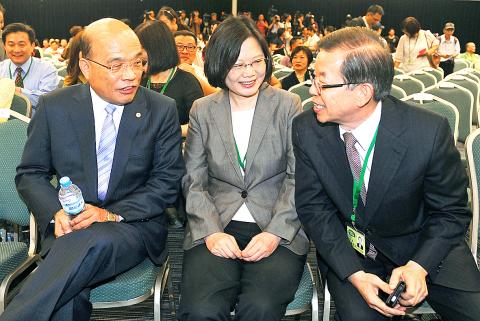The Democratic Progressive Party’s (DPP) leadership for the next two years took shape yesterday during elections at the annual congress as DPP Chairperson Tsai Ing-wen (蔡英文) gained an ability to influence the party’s power structure for the first time.
Tsai, who neither established her own alliance nor became affiliated with any grouping when she served as chairperson between 2008 and 2012, yesterday saw allies voted onto the party’s key decisionmaking bodies — the Central Executive Committee and the Central Standing Committee.
While Tsai has been reluctant to recognize her “special circle” as a faction, she now has five allies among the 30 elected members of the Central Executive Committee and two confidants — DPP Legislator Chen Ming-wen (陳明文) and her former presidential running mate, Su Jia-chyuan (蘇嘉全) — among the 10 elected members of the Central Standing Committee.

Photo: Liao Chen-huei, Taipei Times
This will make it easier for Tsai to consolidate her power in the party and to initiate proposals or defend her policies.
It also highlighted Su Jia-chyuan’s official return to the party’s power structure after a hiatus for almost two years since the 2012 presidential election and the controversy over a residence he built on land zoned solely for agricultural use in Pingtung County.
The biennial elections for the Central Executive Committee, the Central Standing Committee and the Central Review Committee, which oversees the DPP’s internal affairs, were held during yesterday’s congress.
The Central Standing Committee, the DPP’s highest decisionmaking body, has 17 members: the chairperson, three DPP caucus executives, three mayors and 10 elected members — who are chosen from among the 30-person Central Executive Committee.
Almost all the DPP’s former factions fared equally winning seats on the Central Standing Committee. The former New Tide faction won two seats, as did a “faction” of Tsai, Yu and Hsieh, while former DPP chairman Su Tseng-chang’s (蘇貞昌) faction won one seat, as did the Green Friendship Alliance.
The same balanced of power is now found on the Central Executive Committee after the election, with New Tide and the Tsai-Yu-Hsieh side each winning five seats, followed by Greater Kaohsiung Mayor Chen Chu’s (陳菊) faction, which has four seats. Su’s faction and the Green Friendship Alliance each won three seats.
Central Executive Committee member Hung Chi-kune (洪智坤) failed to win re-elected due to a lack of support from any faction.
Eleven Central Review Committee members were also elected.
The DPP voted to ban party factions during its national congress in June 2006, though the groupings are still recognized by many people inside and out of the party.
The Chinese Nationalist Party (KMT) banned party factions in January 2008.

Taipei has once again made it to the top 100 in Oxford Economics’ Global Cities Index 2025 report, moving up five places from last year to 60. The annual index, which was published last month, evaluated 1,000 of the most populated metropolises based on five indices — economics, human capital, quality of life, environment and governance. New York maintained its top spot this year, placing first in the economics index thanks to the strength of its vibrant financial industry and economic stability. Taipei ranked 263rd in economics, 44th in human capital, 15th in quality of life, 284th for environment and 75th in governance,

A former officer in China’s People’s Liberation Army (PLA) who witnessed the aftermath of the 1989 Tiananmen Square massacre has warned that Taiwan could face a similar fate if China attempts to unify the country by force. Li Xiaoming (李曉明), who was deployed to Beijing as a junior officer during the crackdown, said Taiwanese people should study the massacre carefully, because it offers a glimpse of what Beijing is willing to do to suppress dissent. “What happened in Tiananmen Square could happen in Taiwan too,” Li told CNA in a May 22 interview, ahead of the massacre’s 36th anniversary. “If Taiwanese students or

Greenpeace yesterday said that it is to appeal a decision last month by the Taipei High Administrative Court to dismiss its 2021 lawsuit against the Ministry of Economic Affairs over “loose” regulations governing major corporate electricity consumers. The climate-related lawsuit — the first of its kind in Taiwan — sought to require the government to enforce higher green energy thresholds on major corporations to reduce emissions in light of climate change and an uptick in extreme weather. The suit, filed by Greenpeace East Asia, the Environmental Jurists Association and four individual plaintiffs, was dismissed on May 8 following four years of litigation. The

The New Taipei City Government would assist relatives of those killed or injured in last month’s car-ramming incident in Sansia District (三峽) to secure compensation, Mayor Hou You-yi (侯友宜) said yesterday, two days after the driver died in a hospital. “The city government will do its best to help the relatives of the car crash incident seek compensation,” Hou said. The mayor also said that the city’s Legal Affairs, Education and Social Welfare departments have established a joint mechanism to “provide coordinated assistance” to victims and their families. Three people were killed and 12 injured when a car plowed into schoolchildren and their